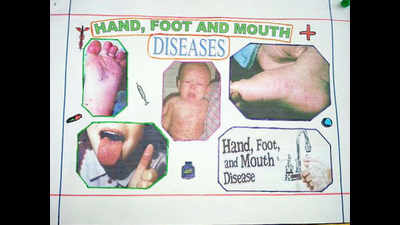- News
- City News
- delhi News
- Rare viral illness causes scare at south Delhi school
Trending
This story is from December 15, 2018
Rare viral illness causes scare at south Delhi school

Image used for representational purpose only
NEW DELHI: A prominent school in south Delhi had a scare recently when one of its students in the junior wing reported with fever, sore throat and rashes. It turned out that the boy was suffering from hand, foot and mouth disease (HFMD), which is contagious.
The boy’s classroom has been disinfected and shut for a few days, school authorities said on Friday, while confirming the incident.
They added that the child’s father works at the zoo. “As she has one more sibling in the school, we have sent guidelines and advisory to the parents.They have been advised to take necessary treatment and inform the school,” said the principal of the school. No other school has reported any such case, according to the principals.
HFMD is a viral infection that causes fever and rash or blisters on the hands and feet, as well as in or around the mouth. Coxsackie virus and enterovirus are the major causative agents of HFMD in India, say experts.
According to the Center for Disease Control and Prevention, US, HFMD is often confused with foot-and-mouth disease (also called hoof-and-mouth disease), which affects animals. “Humans do not get the animal disease, and animals do not get the human disease,” the CDC says.
HFMD is a self-limiting condition and doctors say symptomatic care is needed for the patients. “Most children who suffer from the viral illness have fever, loss of appetite and sore throat. They also have painful sores at the back of the mouth and rashes on the palms and soles of the feet. We advise isolation and rest,” said a senior doctor.
HFMD spreads through contact with the fluid from inside the blisters, or with the droplets spread from sneezing and coughing. Therefore, doctors say parents must be careful not to allow children suffering from the disease to go to school or any crowded place.
“Even at home, it is important to practise good hand hygiene. Parents should wash their hands thoroughly after touching their child’s bodily fluids. This includes touching their blisters and helping them blow their nose,” said a doctor.
The boy’s classroom has been disinfected and shut for a few days, school authorities said on Friday, while confirming the incident.
They added that the child’s father works at the zoo. “As she has one more sibling in the school, we have sent guidelines and advisory to the parents.They have been advised to take necessary treatment and inform the school,” said the principal of the school. No other school has reported any such case, according to the principals.
HFMD is a viral infection that causes fever and rash or blisters on the hands and feet, as well as in or around the mouth. Coxsackie virus and enterovirus are the major causative agents of HFMD in India, say experts.
Dr Atul Gogia, senior consultant, internal medicine at Sir Ganga Ram Hospital, said the disease mainly affects children under the age of 10, but can affect teens as well. “It is a rare disease. But we do come across such cases, mostly in groups. This is because the disease is contagious and children suffering from it often keep going to school,” he added.
According to the Center for Disease Control and Prevention, US, HFMD is often confused with foot-and-mouth disease (also called hoof-and-mouth disease), which affects animals. “Humans do not get the animal disease, and animals do not get the human disease,” the CDC says.
HFMD is a self-limiting condition and doctors say symptomatic care is needed for the patients. “Most children who suffer from the viral illness have fever, loss of appetite and sore throat. They also have painful sores at the back of the mouth and rashes on the palms and soles of the feet. We advise isolation and rest,” said a senior doctor.
HFMD spreads through contact with the fluid from inside the blisters, or with the droplets spread from sneezing and coughing. Therefore, doctors say parents must be careful not to allow children suffering from the disease to go to school or any crowded place.
“Even at home, it is important to practise good hand hygiene. Parents should wash their hands thoroughly after touching their child’s bodily fluids. This includes touching their blisters and helping them blow their nose,” said a doctor.
End of Article
FOLLOW US ON SOCIAL MEDIA










